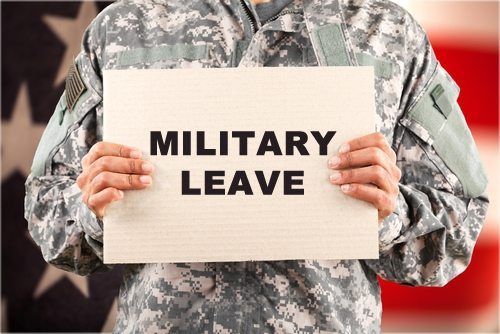As employment lawyers in South Carolina, we deal with issues regarding leave for military employees. South Carolina, like other states, has state and National Guard service members living and working within the state. Serving the country as a uniformed service member can disrupt the normal flow of civilian life with drill weekends or out of state or overseas deployments. In this article, we explain what employers should know about time off and leave for active duty and reserve military employees.
Federal and State Acts Concerning Leave for Military Employees
The federal government enacted the Uniformed Services Employment and Reemployment Rights Act (USERRA) in 1994. The law sets forth rights and responsibilities for uniformed service members and their civilian employers. USERRA ensures that employees who have served or currently serve: 1) are not disadvantaged in their civilian work because of their service; 2) are reemployed to their civilian jobs after deployment; and 3) are not discriminated against based on current, past or future military service. USERRA most frequently applies to Guard and Reserve military personnel, but also covers people serving in the regular Armed Forces, National Disaster Medical System and Commissioned Corps of the Public Health Services. USERRA preempts South Carolina’s state law in any terms where South Carolina’s law is less protective of service members.
Employee’s Obligations Concerning Military Leave
Though USERRA requires employers to offer protections to service members, these employees must provide some information to employers.
- Employees must provide notice to employers that they will be absent due to military service. Employees should give notice to their employers as soon as they have received it. Employees should provide a copy of their orders where possible.
- Employees must leave civilian work for the purpose of military service; nothing else.
- Employees must serve honorably for USERRA to apply; any less-than-honorable discharge from service duties may affect employers’ obligations to re-employ the worker under USERRA.
- Employees may not be absent for more than five cumulative years from any one employer. This provision has some exceptions where calls for service do not count toward the five-year maximum.
- Employees must report back to work in a timely fashion, which depends on the length of service under USERRA. Generally for service less than 31 days, the employee must return at the beginning of the next regularly scheduled work period. For service of 31 to 180 days, the employee must apply for reemployment within 14 days of release from service. And for service of 181 or more days, within 90 days of release from service.
Any deviation from these employee obligations could jeopardize the applicability of USERRA to that employee. However, before taking any adverse action against the employee, the employer should get advice from an employment law attorney.
Employer’s Obligations Concerning Leave for Military Employees
USERRA applies to all public, private and government employers in the United States regardless of size. It also applies to foreign employers doing business in the United States and American companies doing business in foreign countries. If an employee properly takes leave pursuant to USERRA, once the employee returns to work, the employer must reinstate the employee to his/her previous position or a position of the same seniority, status and salary the employee would have had if he had not taken leave. If the employee is no longer qualified to hold the same or similar position he/she previously held, the employer must offer an alternative position for which the employee is qualified and must pay the employee an appropriate salary or wage for the adjusted position. In addition, employees returning from service of 31 days or more may only be discharged for the cause for six months following their return. For service of 181 days or more, discharges must be for the cause for one year following their return.
Issues that Arise with Uniformed Service Leave
Policies are rather clear when applying the Family Medical Leave Act, Americans with Disabilities Act, and in-house policies regarding non-military related leave. However, extended leave associated with uniformed service can pose issues with insurance, benefits, and advancement.
Must the Employer Pay the Employee for Leave under USERRA?
While employers must permit leave under USERRA and must reinstate employees to their previous position with appropriate pay and status, employers do not have to offer this leave as paid unless they offer paid leave for non-military reasons of similar length and circumstances. If an employer offers paid time off (like a vacation or annual leave) and the employee has paid time off for which he or she is eligible, the employee may take paid time off concurrent with the military leave. However, the employee is not required to do so. If an employee is classified as exempt under the Fair Labor Standards Act (FLSA) and the employee works any part of the week, the employer must pay the employee his or her salary for the whole week.
Must the Employer Continue Health Benefits for Leave under USERRA?
If an employee’s USERRA service is less than 31 days, the continuation of medical benefits is the same as when he or she is actively employed. Employees can opt to continue health insurance coverage under the employer’s health plan for up to 24 months for longer periods of service. If an employer’s policy is not to provide insurance coverage beyond 31 days, the employee is entitled to continuation coverage similar to COBRA coverage terms.
Escalator Principle
The escalator principle levels the playing field so the employee remains entitled to the position he or she would have held had he or she not been on military leave. If an employee is on military leave from a civilian position that would have entitled the employee to advancement while the employee was on leave, the employer must provide the employee with that advancement. This obligation requires the employer to make reasonable efforts to train the employee to make him or her qualified for the advanced position.
Must the Employer Provide Pension or Retirement Plan Contributions?
The basic rule is that employers must fund pension benefits that a re-employed participant did not receive due to qualifying military service. An employee may be out for an extended period but still accrues time as if there were no break in service for purposes of a pension. For a defined contribution plan, a rehired veteran is permitted to make up contributions required to earn a benefit accrual for the military service period. If the employer offers a 401(k) plan where both the employer and employee contribute, the employee must be permitted to make up contributions over a three-year period during which the employer with also make contributions. The employee designates what period the contributions cover. For a defined benefit plan, employer contributions generally must be made no later than 90 days after the date of reemployment, or when the contributions are normally due for the year in which uniformed service was performed, whichever is later.
Conclusions
The requirement to permit military leave (with or without pay) and to reassure service member employees that their jobs are waiting for them upon their return is clear. The nuanced obligations employers owe to employees may be murkier to determine. Contact an experienced employment lawyer at Gignilliat, Savitz & Bettis, LLP to review your circumstances or employee policies regarding military leave.






